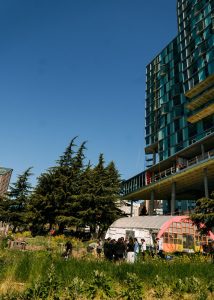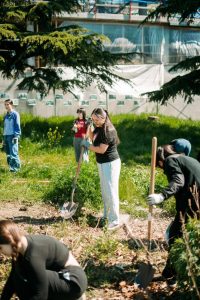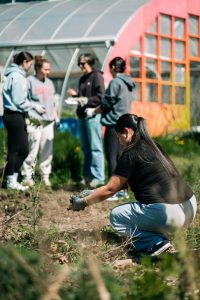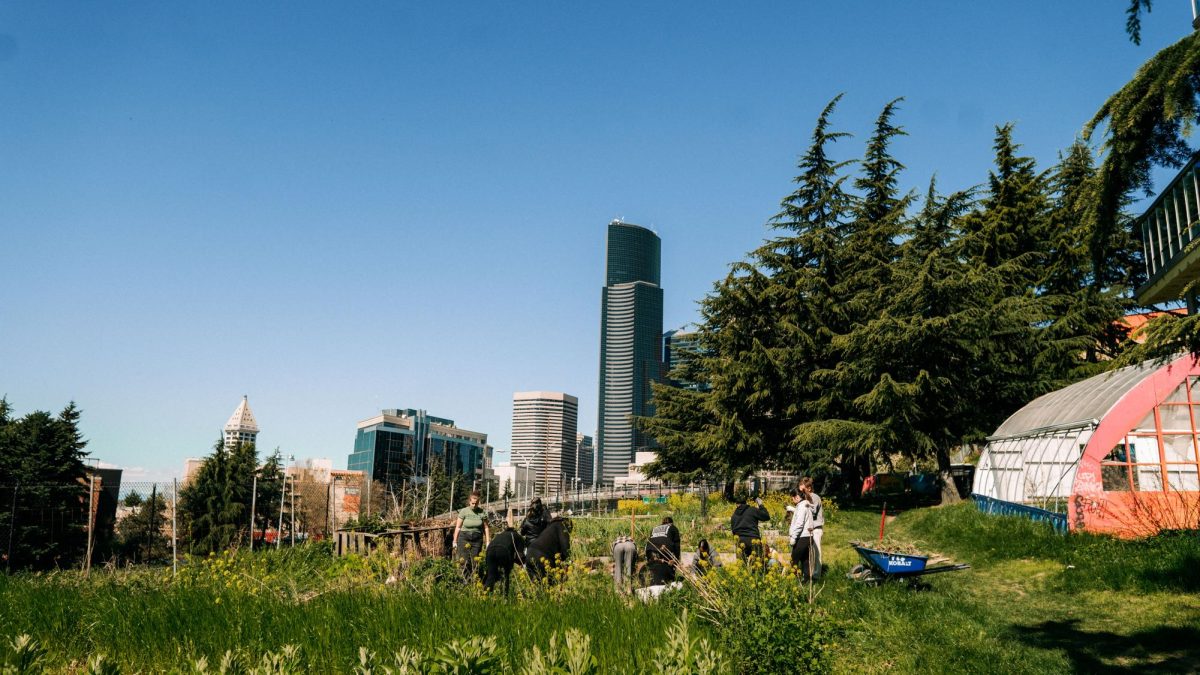
At a local farm off Yesler Terrace, students can be found wielding garden tools, sifting through soil and learning from community members about the importance of food systems as they cultivate a green space.
To bridge the gap between the classroom and the real world, service-based learning gives students the opportunity to contextualize class concepts through hands-on experience. The relationship between Yes Farm and a University Core class exemplifies this idea.
Yes Farm is a 1.5 acre property in Yesler Terrace garden, parallel to Interstate 5, where neighborhood locals are welcome to volunteer alongside others in their community and learn about sustainable urban agriculture.
Brenda Bourns, a teaching professor of cell and molecular biology at Seattle University, teaches courses in the UCOR natural science section, one being “Sustainable Agriculture.” Offered in the spring, it splits students’ time between a traditional lecture and service-based learning at Yes Farm.
With an interest in the university’s Community Engaged Learning (CEL) program, Bourns connected with the Center for Community Engagement (CCE) to participate. It has served as an avenue to building relationships with communities neighboring Seattle U while offering students the opportunity to connect the concepts they learn in class to hands-on service experiences.
It was through CCE that Bourns got in contact with Ray Williams, the co-founder and managing director of the Black Farmers Collective, the parent organization of Yes Farm.
As the course covers trends of the food system and the environmental impacts of farming practices, that knowledge works in combination with students visiting Yes Farm every week.
‘“Dr. Bourns’ class gives us the opportunity to really share what we have here and complete our mission of trying to teach people about the food system and build that. It’s been a great partnership over the years,” Williams said.

While building those connections, Bourns is intentional about her approach, putting an emphasis on how her class can serve others, not take.
“We’re not asking the community to do something for us. We’re asking what [do] we want to learn from people,” Bourns said. “The Center for Community Engagement is front and center in what they do and the training they give us… ‘What does the community partner need [from us?],’ [it’s] not what they can do for us. We’re always asking that question.”
To Bourns, volunteering at Yes Farm is valuable because it exposes students to diverse perspectives. With the goal of building a Black-led food system, the Black Farmers Collective is motivated to cultivate green spaces by centering the needs of BIPOC communities impacted by gentrification and system oppression.
Acknowledging that students come from various backgrounds, Bourns talked about how this exposure to local communities of color compels students to consider how they are coming into another’s space as well as the lived experiences of that group.
“The Black Farmers Collective…is teaching us about how non-Black people coming into Black spaces impacts Black communities, and that is another side aspect of the course that’s been really useful for many of us who haven’t given that much thought,” Bourns said.
Bourns stressed the importance of being involved with service-learning at Seattle U. As the school is centered in a uniquely urban place, students have a vast amount of opportunities to serve their community.
“Virtually nowhere has the same relationship with their community that Seattle U tries to foster. We’re not perfect but this is where I see the benefits to the university and to our students,” Bourns said. “This service learning aspect, I think that’s one of the best things to do.”

Each spring, Bourns takes her students to Yes Farm roughly every Thursday within the scheduled class meeting time. During that time, students engage in assisting in general projects around the property while learning from the farmers.
Pasheen Johnson, a third-year journalism major, was interested in how farming works in an urban area. She feels that going to Yes Farm has been a beneficial learning experience as it has also allowed her to connect with new individuals.
“It’s really interactive and hands-on, and it’s also something I do at home like planting and everything and I wanted to learn more about it,” Johnson said.
Bourns expressed the value that service learning holds as it allows students to interact and experience the natural world. She acknowledged the benefits that it could have if incorporated in the curriculum more often.
“Experiential learning [is] really important… [I think we should] have more options, for students that are interested in that, in our curriculum,” Bourns said.






Sundborg Center for Community Engagement
Jul 10, 2024 at 10:41 am
This is a wonderful article and so meaningful to see the story told from a student’s perspective. You did an amazing job capturing CCE’s work, YesFarm’s mission and the community engaged learning course. We are honored to be in community with you all.
Brenda Bourns
Apr 30, 2024 at 8:12 am
What a nice, well-researched article about a unique type of Seattle University course. From the standpoint of the teacher, this is such a blessing of this job – being supported to offer impactful experiences in learning for our students is one of the things that makes teaching at and being a part of the Seattle University community so fulfilling.